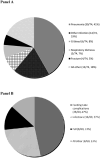Hospital transfers of nursing home residents with advanced dementia
- PMID: 22428661
- PMCID: PMC3354640
- DOI: 10.1111/j.1532-5415.2012.03919.x
Hospital transfers of nursing home residents with advanced dementia
Abstract
Objectives: To describe diagnoses and factors associated with hospital transfer in nursing home (NH) residents with advanced dementia.
Design: Prospective cohort study.
Setting: Twenty-two Boston, Massachusetts-area NHs.
Participants: Three hundred twenty-three NH residents with advanced dementia.
Measurements: Data were collected quarterly for up to 18 months. Data regarding transfers were collected with regard to hospitalization or emergency department (ED) visit, diagnosis, and duration of inpatient admission. Information on the occurrence of any acute medical event (pneumonia, febrile episode, or other acute illness) in the prior 90 days was obtained quarterly. Logistic regression conducted at the level of the acute medical event identified characteristics associated with hospital transfer.
Results: The entire cohort experienced 74 hospitalizations and 60 ED visits. Suspected infections were the most common reason for hospitalization (44, 59%), most frequently attributable to a respiratory source (30, 41%). Feeding tube-related complications accounted for 47% of ED visits. In adjusted analysis conducted on acute medical events, younger resident age, event type (pneumonia or other event vs febrile episode), chronic obstructive pulmonary disease, and the lack of a do-not-hospitalize (DNH) order (adjusted odds ratio = 5.22, 95% confidence interval = 2.31-11.79) were associated with hospital transfer.
Conclusion: The majority of hospitalizations of NH residents with advanced dementia were due to infections and thus were potentially avoidable, because infections are often treatable in the NH. Feeding tube-related complications accounted for almost half of all ED visits, representing a common but underrecognized burden of this intervention. Advance care planning in the form of a DNH order was the only identified modifiable factor associated with avoiding hospitalization.
© 2012, Copyright the Authors Journal compilation © 2012, The American Geriatrics Society.
Conflict of interest statement
Figures
References
-
- Mitchell SL, Teno JM, Miller SC, et al. A national study of the location of death for older persons with dementia. J Am Geriatr Soc. 2005;53:299–305. - PubMed
-
- Fillenbaum G, Heyman A, Peterson BL, et al. Use and cost of hospitalization of patients with AD by stage and living arrangement: CERAD XXI. Neurology. 2001;56:201–206. - PubMed
-
- Bynum JP, Rabins PV, Weller W, et al. The relationship between a dementia diagnosis, chronic illness, medicare expenditures, and hospital use. J Am Geriatr Soc. 2004;52:187–194. - PubMed
Publication types
MeSH terms
Grants and funding
LinkOut - more resources
Full Text Sources
Medical


